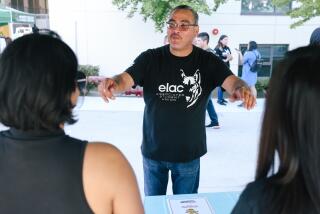Virtual campus tours give students an insider’s view
- Share via
Reporting from Miami — When college students begin classes this month, some arrive after getting their acceptance notices on Facebook. Others are using smartphone applications to find out which parking spots are available. And others show up after taking walking tours of their campuses — without ever leaving their homes.
Universities are turning to new media, like interactive videos and smartphone apps, to keep competitive and attract students. For example, take Barry University in Miami Shores, Fla., where students use a Facebook app to browse available housing, pay room deposits and register for orientation. They will even be notified on Facebook when they are accepted into the school before formal letters arrive by regular mail. With one click, students can instantly share the big news to their network of friends.
“We want to take our system to where they are,” said Michel Sily, assistant vice president for enrollment marketing and Internet strategies at Barry University.
That’s the new mantra fueling the growth of YourCampus360, a start-up that creates virtual, interactive tours for colleges for the university website, mobile apps and Facebook pages. Its founders are based in Aventura, Fla., and New York, and after going live last year, the tours are available on 67 school campuses in the U.S. (40 of which signed up this year), including Stony Brook University, Syracuse University, Brandeis University and Ohio University.
An animated guide narrates with information about the campus and student life as users click to “walk” through campus. Similar to how Google Street View works, users click through a series of progressive 360-degree images from various points along the walking path, with an audio track describing notable landmarks.
Abi Mandelbaum, chief executive, said more than 1 million users have taken a virtual campus tour so far, and some clients are reporting an increase in physical campus visits since implementing the tour, as much as 30% for some schools, he said.
The tours can be offered in multiple languages and cost $5,000 to $15,000 a year to create, maintain and update, depending on the package a school chooses and if it will include an app or Facebook page.
“The grand majority of schools that sign up with us, they sign up with all the platforms. They recognize that they need to be out there,” Mandelbaum said.
Some campuses already have their own flavors of virtual tours and apps. At Florida Atlantic University, prospective students can send in an application from its Apple device app. FAU partnered with Blackboard Mobile, the same vendor behind apps for the University of Miami and Florida International University, which launched its app in August.
Every school is on networks like Twitter, Foursquare, YouTube and Facebook — but at the University of Miami, each graduating class has its own Facebook page. The class of 2015 Facebook page used to be managed by the Admissions Department but now is overseen by Student Affairs and will be taken over by the alumni group when the time comes.
“It’s more about being reactive to what students want,” said Edward Gillis, assistant vice president for enrollment management and executive director of admissions. “I’ve been doing this for 40 years, and before you sent out a brochure and sent out an application, and some applied and some didn’t. Nowadays it’s totally different.”
Carey writes for the Miami Herald/McClatchy.
More to Read
Inside the business of entertainment
The Wide Shot brings you news, analysis and insights on everything from streaming wars to production — and what it all means for the future.
You may occasionally receive promotional content from the Los Angeles Times.










